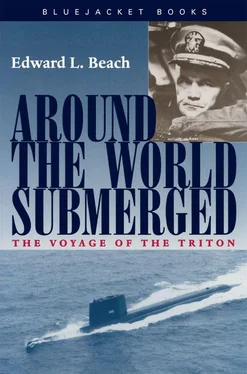All in all, there was plenty to occupy everybody as we proceeded on the first leg of our “official” circumnavigation.
As it happened, the run down the coast of South America started out smoothly enough, but it didn’t end that way. On the first of March, 1960, Jim Stark, a Commander in the Medical Corps, USN, and our ship’s doctor, sought me out.
“Captain,” he said rather abruptly, looking serious, “I’m afraid we have a pretty sick man aboard.”
This, of all things, was what I had been dreading most. “Who is it?” I asked. “What’s the matter with him?”
“It’s Poole,” said Jim, “Chief Radarman. I’m afraid he might have a kidney stone.”
My tone of voice must have indicated relief that it wasn’t something highly contagious like smallpox or meningitis. “Oh,” I said. “He’s not really sick then, is he?”
Stark grinned wryly. “It’s not infectious, Captain, if that’s what you mean, but he’s a pretty sick boy, all right. The trouble is there’s nothing I can do about it.”
“You mean you can’t treat him on board?” I asked, feeling the glimmerings of worry again.
Jim nodded. “He’s not sick in the sense of having a germ or a bug of some kind, but if you take a look at him, you’ll agree that if he doesn’t improve, we do have a problem. You need special tools for this, and we don’t have any of them. This is a job for a hospital.”
Stark produced a thick medical book with photographs and drawings to illustrate Poole’s problem. A stone had formed in one of Poole’s kidneys, had been dislodged, and was now in a ureter tube where it was damming the normal flow. The specified treatment was rather similar to what one might do with a clogged drain line on board ship, but as Jim patiently explained the techniques of doing it and described the delicate equipment which we did not have—which included an X-ray outfit—I began to understand his concern.
“Suppose the kidney stone remains stuck in the tube,” I said. “What happens then?”
“Well,” replied Jim, “in the first place, it’s terribly painful—and that’s what’s happening to Poole now. That’s why I’ve had to give him sedation. If there’s no relief—in extreme cases—there can be mild or serious damage of the kidney, which could result in a permanent injury. In an extreme case,” he said soberly, “if unrelieved, a person could die.”
“You mean he’s in danger?”
Jim hastened to assure me that this was not so. The treatment Poole was receiving at his hands was the standard treatment in the early stages of a kidney stone ailment. In most cases, the trouble cleared up more or less spontaneously, with the stone passing the rest of the way down the tube and out of the body in the urine. Poole was already using a specimen bottle, he explained, and his urine would be carefully examined.
“I’m giving him morphine to ease the pain,” Jim said, as he rose to leave. “All we can do is wait.”
I sat pondering. Prior to leaving New London, I had been briefed on the general locations of all US naval units in the areas near which we might be passing, and I knew that the Macon, a cruiser built at the end of the war, was somewhere in these waters. Maybe we could effect a rendezvous with her. But even if we were to do so, how could we transfer Poole without surfacing—and if we were to surface, would this not ruin our submerged record? Suppose we were to surface, transfer Poole to the Macon, and keep it a secret. Would our submerged record still be valid? Suppose the press discovered it; suppose—after the cruise was announced publicly—the newspapers of the Soviet bloc were to get hold of the item? Would it not be terribly embarrassing to our country? What about the special purpose of our mission? Would this not, in fact, utterly destroy it?
To this last question, at least, I knew the answer as soon as I formulated it. As for the rest, going around the world submerged was naturally tremendously important to us as a morale factor. No doubt it held real value for our Navy and our country, particularly in view of the Russian successes with their Sputniks. But so far as the fundamental purposes of our voyage were concerned—the research to be made, the data to be collected—surfacing for an hour or so would make no difference at all. But we could not under any circumstances pretend to an accomplishment we had not done.
And I knew, or sensed, another thing, which was simply that either Poole passed the kidney stone and recovered, or we would have to get help for him somehow, somewhere. Were this war, were our mission one of life or death, were the ship to be endangered with the possibility of more lives lost if we exposed ourselves in order to help Poole, then there might conceivably be some excuse for gritting our teeth and making him grit his. But not under the circumstances that existed.
Jim Stark, however, had made it clear that the situation was not yet desperate. We could hang on a while longer and await developments.
I had just about reached this point in my reasoning when there came a rap on my door, and Dick Harris pulled aside the curtain. He, like Stark, wore a troubled look.
“What’s on your mind, Dick?” I asked. “Have you a kidney stone in your sonar?”
Dick’s face twisted. “Something like that perhaps, Captain,” he said. “It’s the fathometer.”
Constitutionally, I needed much less background information to become excited about a sick fathometer than about a sick kidney, and I was intensely concerned. “What’s the trouble, Dick?” I asked.
As he answered, Dick characteristically chose his words carefully. “We’ve been slowly losing sensitivity with the fathometer,” he said, “and I’ve started checking into it. The strength of the echo is becoming noticeably weaker. I worked on it for a couple of hours last night, but it is still weaker than it should be, even though we seemed to have been able to make some improvement in it. We’re getting only a faint echo, and it could go completely out of commission at any time.”
“Where do you think the trouble is?” I asked. “Is it in the transmitter head, do you think, or the transmitting or receiving section of the set itself?”
“Dunno yet, Captain,” he said. “As far as we can tell, the outgoing signal is about the same strength as ever, but the return signal seems to be weaker. Maybe we’ll find something wrong with the receiver section, and if we can get the right parts, we should have it back in commission soon.”
“Keep me advised, Dick,” I said. “The fathometer is a mighty important instrument for this cruise, especially since we are passing over waters that are basically uncharted.”
Dick tried another twisted half-grin. “I know that, sir,” he said. “‘Whitey’ Rubb is in there helping us with his electronic technicians. Maybe that will speed up the process of figuring out what’s wrong with it.”
After Dick left, I sat for a long moment. Now there were two problems to ponder. Shallow water areas near most of the big land masses of the world are well charted these days, and a surface ship has generally little difficulty picking its way along an unfamiliar coast as long as it has the right chart. But nobody had ever gone to much trouble to make accurate charts of deep waters, the so-called “off-soundings” areas, which comprise ninety-nine percent of the oceans. Our unsuspected discovery of a new and previously uncharted mountain peak as we neared St. Peter and St. Paul’s Rocks a few days ago was a case in point. The chart of the South American coast showed a number of very shallow spots—just dots on the charts—where evidently some submerged mountain peaks had been discovered more or less by accident as ships passed overhead. Surface vessels had been passing over these peaks in perfect safety for centuries, their existence entirely unsuspected. But our situation in Triton was very much different, for we were traveling many hundreds of feet deeper than a surface ship. At the speed we had to go, our ship would be heavily damaged by even a glancing contact with the bottom, and I didn’t even want to think of the result of striking the vertical face of a cliff like the one we had found a week ago. Traveling in uncharted waters, the fathometer was absolutely vital to us.
Читать дальше












